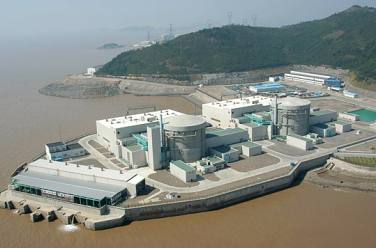A deal involving only C$15 million up front will see the Canadian government pass over the Candu reactor division of Atomic Energy of Canada Ltd (AECL) to engineering company SNC-Lavalin.
 |
| Overseas projects like China's Qinshan III will be a target |
Taking control of the reactor vendor will be one of SNC-Lavalin's subsidiaries, Candu Energy. It will take over the provision of services to the existing fleet of Candus, execution of life extension projects and reactor new builds. While the price of the business was just C$15 million ($15.5 million), the Canadian government will also be receiving royalty payments from future new build and life extension projects and also retain ownership of all Candu intellectual property. The government will provide a licence to Candu Energy to grow the business. AECL will retain its past liabilities.
The Canadian government has been looking to restructure AECL since 2009, and SNC-Lavalin - which has a long history of partnering AECL in construction projects - has long expressed interest in purchasing the commercial arm of the state-owned corporation. SNC-Lavalin's executive vice-president for global power, Patrick Lamarre, said that the acquisition would require "concerted and coordinated efforts" to make it a success but was upbeat about future projects. "With our expertise and experience in the nuclear sector, we believe that Candu Energy will allow us to open new markets and capitalize on existing ones."
"The Candu commercial reactor business will benefit greatly from SNC-Lavalin's entrepreneurial capacity and global scale," said Canadian minister of natural resources Joe Oliver, adding that the transaction would place Candu technology in "proven, competent hands to be serviced and deployed in Canada and abroad, meeting energy needs and stimulating a supply chain located largely in Canada."
AECL was established in 1952 and has managed Canada's nuclear energy research and development ever since. It developed the heavy-water moderated and cooled, natural uranium fuelled Candu reactor (its name is taken from 'Canada deuterium uranium') in the late 1950s. Canada's 18 nuclear power reactors are all Candus, with the Candu 6 the most recent variant to be built. AECL has exported the reactor to Argentina, China, India, Pakistan, Romania and South Korea. It also offers the Enhanced Candu 6 (EC6) design is proposing the 1200 MWe ACR-1000 (Advanced Candu Reactor), which uses light water coolant and offers enhanced passive safety features.
Separate from the Candu reactor business, AECL's mandate includes isotope production, waste management and decommissioning activities. The Canadian government announced plans to restructure the company in 2009 after a review concluded that AECL's success and development were limited by the existing mandate and structure which also prevented it from accessing capital markets and making equity investments. In its announcement of the acquisition, SNC-Lavalin describes the privatisation of AECL as "an endeavour to keep alive the Canadian nuclear industry."
The acquisition is expected to be finalised in the early autumn of 2011.
Future gazing
New build projects in Ontario, Canada and overseas in countries including Argentina, China, Jordan and Turkey have been identified as targets for Candu Energy. Candu reactors require refurbishment and replacement of core components after about 25-30 years of operation, making life extension projects a key part of the business. The new company will also complete remaining obligations under ongoing life extension projects at Bruce Power, Point Lepreau and Gentilly 2 in Canada and Wolsong in South Korea through subcontract service agreements with the Canadian government.
The sale will not see the Canadian government divest itself of all links with Candu development. According to SNC-Lavalin, the government has pledged up to C$75 million ($78 million) to support Candu Energy as it works towards completing the EC6 development program.
Researched and writtenby World Nuclear News






_55401.png)
_23009.jpg)






